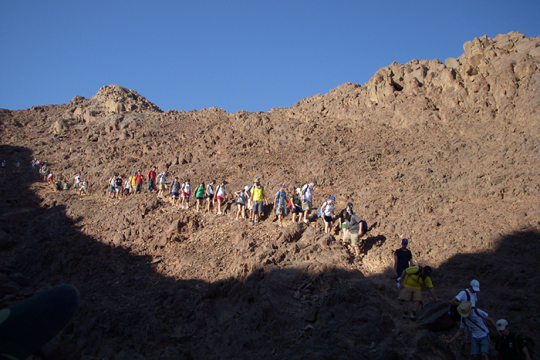
I started a new congregational position this year. The job, which is part-time, is at a wonderful congregation that meets in a 315-year old Presbyterian church. Since my working hours are limited, I am focused on making the most of my time there. In addition to the normative stuff of synagogue life – leading Shabbat services, running the school, training B'nai Mitzvah students, giving pastoral support, and the all-important schmoozing at Oneg – I wanted to bring a new initiative or program that would reflect who I am, and more importantly, achieve one of the most important aspects of synagogue life – building community. And what better way to build community than through a monthly meeting dedicated to study and conversation.
Rosh Chodesh, the head of the new month, serves as a practical and spiritual moment on our Jewish calendar for this very purpose. Rosh Chodesh provides us with a monthly pause to mark a sacred moment on the Jewish calendar. A true gift of Judaism is our human ability to recognize the holiness of time. In the Talmud (Sanhedrin 41b) we are requested to stop, go outside, and praise God for the new moon. It is not enough to see the date written on a calendar; the blessing is to be recited outdoors while gazing at the moon as she begins her monthly escalation.
The natural rhythm of the moon's monthly waxing and waning sets the date for the Rosh Chodesh gathering at my synagogue. I try to plan the meetings within 48 hours of the actual appearance of the new moon, which is no easy task. The moon's cycle is 28 days. Hence, our meeting's pattern is not the "normal" one of most synagogue functions, (e.g., Kabbalat Shabbat services on Friday evenings, Torah study on Saturday mornings). The new moon seems to "float" around, grabbing various days of the week at her whimsy. The actual Rosh Chodesh, or in my case, my synagogue's monthly Rosh Chodesh gathering, can happen any day of the week.
Perhaps "paying attention" to the new moon is a life lesson to pay attention to the cyclical pattern of the natural world – not the "calendar" we human beings try so desperately to manipulate and control with our technological devices designed to keep "it" all in order…whatever our "it" may be. This is nature's poetic approach of teaching us to glimpse up into the night sky – as did our ancient sisters of yesteryear – and track our lives by something bigger and brighter. Could it be when I am standing under the canopy of the night sky with the silhouette of the trees against the inky blackness that I am not the first, and certainly not the last, to be in awe of the moon and her luminous power?
Let the rhythm of the moon teach you to be "where you are" and where you need to be. And how lovely to do this surrounded by members of my spiritual community, where I know Judaism is the tool, and Rosh Chodesh the particular vehicle, for creating and enriching these gatherings of study and personal growth. I appreciate Rosh Chodesh for creating these new and intense relationships, and for connecting us to the women of our sacred tradition who also used the new moon to gather for these very reasons.



